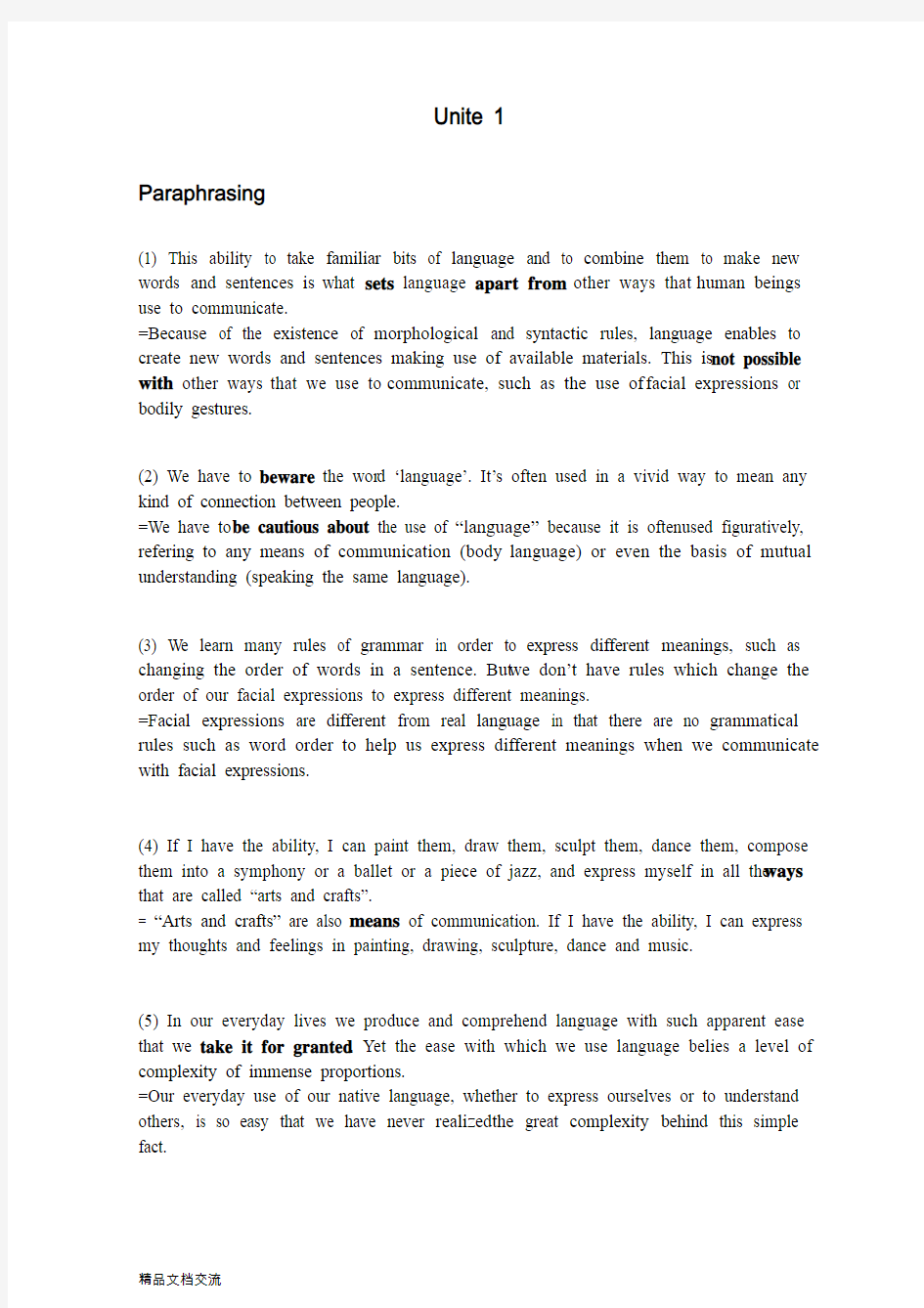英语专业精读1课后1-7

- 1、下载文档前请自行甄别文档内容的完整性,平台不提供额外的编辑、内容补充、找答案等附加服务。
- 2、"仅部分预览"的文档,不可在线预览部分如存在完整性等问题,可反馈申请退款(可完整预览的文档不适用该条件!)。
- 3、如文档侵犯您的权益,请联系客服反馈,我们会尽快为您处理(人工客服工作时间:9:00-18:30)。
Unite 1
Paraphrasing
(1) This ability to take familiar bits of language and to combine them to make new words and sentences is what sets language apart from other ways that human beings use to communicate.
=Because of the existence of morphological and syntactic rules, language enables to create new words and sentences making use of available materials. This is not possible with other ways that we use to communicate, such as the use of facial expressions or bodily gestures.
(2) We have to beware the wor d ‘language’. It’s often used in a vivid way to mean any kind of connection between people.
=We have to be cautious about the use of “language” because it is oftenused figuratively, refering to any means of communication (body language) or even the basis of mutual understanding (speaking the same language).
(3) We learn many rules of grammar in order to express different meanings, such as changing the order of words in a sentence. But we don’t have rules which change the order of our facial expressions to express different meanings.
=Facial expressions are different from real language in that there are no grammatical rules such as word order to help us express different meanings when we communicate with facial expressions.
(4) If I have the ability, I can paint them, draw them, sculpt them, dance them, compose them into a symphony or a ballet or a piece of jazz, and express myself in all the ways that are called “arts and crafts”.
= “Arts and crafts” are also means of communication. If I have the ability, I can express my thoughts and feelings in painting, drawing, sculpture, dance and music.
(5) In our everyday lives we produce and comprehend language with such apparent ease that we take it for granted. Yet the ease with which we use language belies a level of complexity of immense proportions.
=Our everyday use of our native language, whether to express ourselves or to understand others, is so easy that we have never realizedthe great complexity behind this simple fact.
Translation
(1)Once we’ve learned a few thousand words, and learned the ways our language allows us to put them together into sentences, we can say things that nobody has ever said before.
一旦我们掌握了数千个单词和语言所允许的将这些单词组合成句的方法,我们就可以说出别人从未说过的话。
(2)When people use their fa ces or hands to show their feelings, they’re doing something that is very different from what they do when they speak, write, or use a deaf sign language.
当人们用脸或手来表达情感的时候,他们所做的是一件与说话、书写或者使用聋人手语很不一样的事情。
(3)Language allows us to talk about our experience of the world in a way that no other means of communication can.
语言使我们能够以一种其他交际手段所不能比拟的方式谈论我们对世界的体验。
(4)那件鲜红的大衣使她在姑娘们中间显得特别突出。(apart from)
Her bright red coat set her apart from the other girls.
(5)我们的触觉能力也可以演绎出一套语言。(develop into)
Our ability to touch can also be developed into a language.
(6)他以蛮横无理的方式对他的助手们发号施令。
He orders his assistants around in a way that is very offensive.
(7)与书面语不同的是,我们在口语中并不是按照段落或章节来组织思想的。
